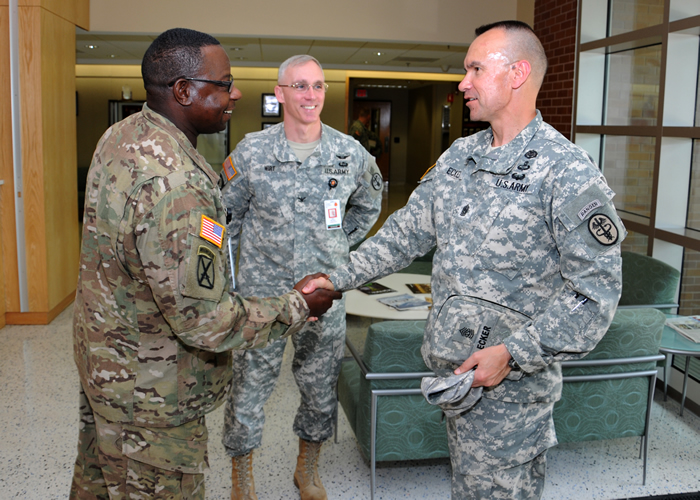MEDCOM Command Sgt. Maj. Visits Combat Casualty Care Research Staff

Command Sgt. Maj. Gerald C. Ecker, U.S. Army Medical Command senior enlisted leader, visited the U.S. Army Institute of Surgical Research Sept. 8 to meet with the staff and become familiarized with latest combat casualty care research.
The call to the Fort Sam Houston, Texas, headquartered command was Ecker's first, and was an opportunity for the enlisted Soldiers and staff of the Institute to showcase their research aimed at optimizing care for Wounded Warriors.
"The importance of this visit was first to thank every member of the team for their contributions in optimizing combat casualty care over the past 15 years of war," said Ecker. "The ISR has been and is central to understanding the science of how to provide effective combat medical interventions to very complex wounds and injuries far forward on the battlefield."
Ecker, who is a combat medic, knows firsthand the importance of having well-trained medics with state-of-the-art equipment and material to save lives of those wounded on the battlefield.
"I want to ensure that our medical Soldiers performing their duties within the scientific walls of the ISR have a full appreciation for the battlefield art that our first responders and combat medics must master outside of a controlled environment" he said. "In order for us on the Army Medicine team to master our profession of saving lives, we must understand not only the Warfighter, the enemy and terrain but also see ourselves within the overall situation. I believe this methodology then provides the why of what we medics do, in whatever our capacity."
Sgt. Maj. James L. Devine, USAISR senior enlisted leader, said he was pleased with briefs Ecker received on the latest research initiatives and burn care at the USAISR Burn Center.
"Our Soldiers and staff did a great job at providing Command Sgt. Maj. Ecker with a detailed description of the various research task areas at the ISR," said Devine. "I believe he now has a better understanding of our mission, capabilities and responsibilities."
Ecker ended his visit at the USAISR with a talk to the Soldiers where he encouraged them to read and be familiar with the Army's transformation and future outlook.
"The ISR's future endeavors of professional expertise will certainly be needed in order to meet the demands of our Army continuing to win in a complex world," Ecker said.
Sgt. Francisco A. Rosario, non-commissioned officer in charge of the Burn Intensive Care Unit and the Burn Flight Team, briefed Ecker on burn care, patient medical evacuations and inflight patient care. Rosario believes that it is imperative for senior leaders to make these types of visits to gain knowledge of the command and for the Soldiers to receive the latest information directly from Army leaders.
"Command Sgt. Maj. Ecker was able to provide a detailed overview of the Army's goal to ensure that every military treatment facility becomes a high reliability organization, while operating as a medical training and readiness platform," said Rosario.
"Our ISR Soldiers are extremely intellectually gifted, mission-oriented and impressive, and they provide a unique capability that will help our Army win," Ecker said.
 An official website of the United States government
An official website of the United States government
 ) or https:// means you've safely connected to the .mil website. Share sensitive information only on official, secure websites.
) or https:// means you've safely connected to the .mil website. Share sensitive information only on official, secure websites.


